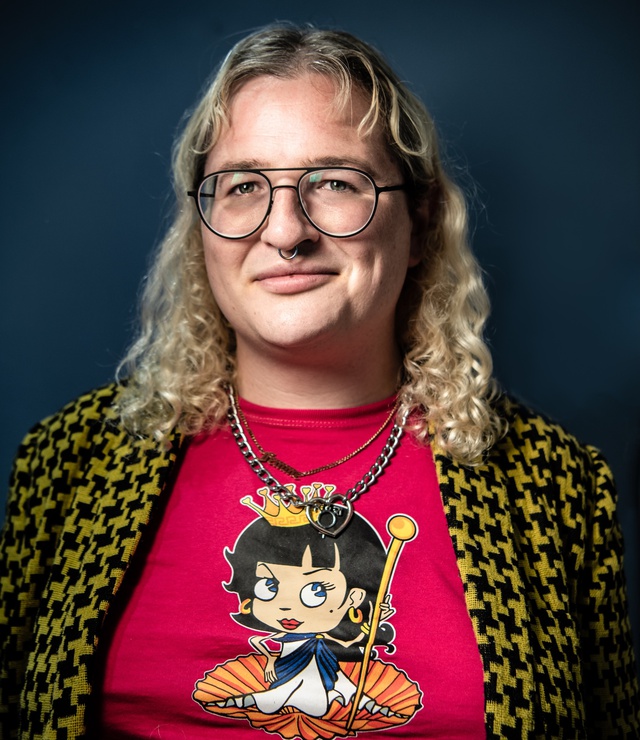The Performance Of Gender And Being Your True Self
26.06.24
Tabby Lamb is a trans writer and performer from East London, inspired by Carly Rae Jepson and Tennessee Williams. Notable works include the award-winning "HAPPY MEAL" and "SINCE U BEEN GONE." In 2023, her play "A GRIEVANCE OF WITCHES" was the first by a trans woman at Shakespeare's Globe. She's developing TV projects and is involved in various artistic programs, supporting LGBTQ+ youth through creative arts.
Instagram: @badgalenby
Her piece is the fourth and final in a series on queer performance. Read the first piece by Zoe Paskett here, the second by Jodie Mitchell here, and the third by Temi Wilkey here.
There’s no denying that fashion is cyclical. Trends re-emerge more often than Spiderman is rebooted. Even knowing this, nothing quite prepared me for the way my personal gender performance would change once I medically transitioned, and what trends I would embrace as a woman.
I've been out as trans for nearly 15 years — over one third of my life — and I do not believe that you need to have surgery to be trans, however there's no denying that changing your body shape can change the types of clothes you wear. It’s all part of the performance of gender (which even this binary babe can admit probably doesn’t actually exist). I went from wearing baggy ill-fitting t-shirts, picked to hide my body shape, to wearing tight babydoll tees, picked to accentuate and show it off.
As a teenager, my eating was disordered and I've always suffered with body dysmorphia, one of the many reasons it took until I was 32 to get any gender affirming surgeries. I was scared of adding anything to a body that already felt too big, too lumpy and just not mine. But getting top surgery saved my life. Now, I embrace my body. I’m super comfortable having my belly or legs out “despite” being in my mid-thirties and being bigger than I have ever been. Something about being a girl with curves just hits right.
In my 10 years using exclusively they/them pronouns I was very aware that I was still viewed by the cishet majority as a man, and this made me extremely uncomfortable. So to flag my queerness, I wore more and more feminine clothes. For three years I dressed exclusively in varying shades of pink. I’d wear floral prints and pastel colours and, once I was more comfortable in myself and my gender, flowy skirts and dresses. But now, mid way through my medical transition (gender affirmation surgery is damn expensive and NHS waitlists are sometimes even decades long… so this is no quick journey) I am most comfortable in baggy jeans or cargo shorts with a shirt and tie. I describe my style as ‘futch’, a combination of Femme and Butch.
With my body being read more feminine, flagging my queerness has changed. I expect this is due to a number of things. There is undoubtedly the personal safety aspect that comes with having boobs: yesterday, within ten minutes of leaving my house, I was approached by three men making unwanted advances — at 3pm in the afternoon! Then, there’s historic dyke fashion trends that pop stars like Billie Eilish and Renee Rapp are bringing back, referencing The L Word and early 90s dyke styles.
I am proudly pansexual, but my style has definitely been influenced by the Dyke Renaissance currently occurring in London. Flagging queerness looks very different on different sides of the binary. In an assumed male body, my queerness was feminine and soft, whereas in the comfort of a female body, queerness means oversized suit jackets and carabiners. It means chunky jewellery mixed with an ironic fat tie and, most interestingly to this formerly colourful girlie, it means wearing more muted colours, and often an entirely monochrome look.
I'm a playwright by trade, and the past few years I've been working on a lot of plays with young people — young trans people especially — and there is no doubt in my mind that these kids have influenced the way I now perform my gender. In the late 2000s or early 2010s, they were born into the very small bubble of time when gender was neither an expectation or a political scoring point. They were born after Nadia won Big Brother but before “the transgender tipping point”. They were able to see trans YouTubers and even pop stars thrive and develop their own personalities and gender performance before our government (and shadow government) decided to use us as political punching bags.
Trans people and trans style isn't going anywhere though. The government can try to eradicate us by banning hormone blockers, excluding us from public spaces or making it impossible to access surgery — but we exist and that’s never gonna change. And I for one, intend to live as loudly as possible to show everyone all the possibilities that come from being true to yourself.
If you'd like to keep up to date with all our blog posts, important and interesting stories in the worlds of theatre, arts and media, plus job ads and opportunities from our industry friends, sign up to our daily media briefing at this link.



